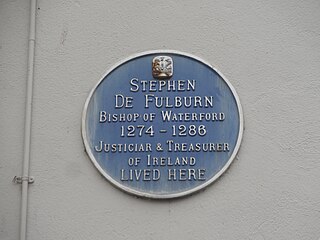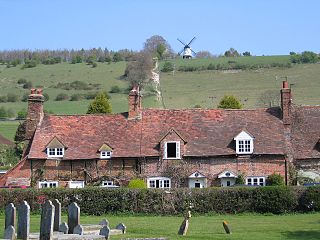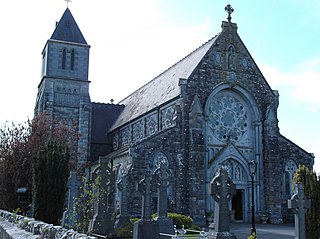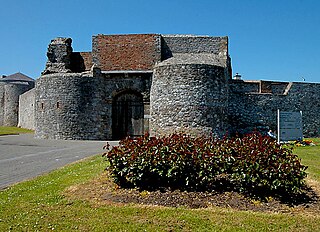The Lord High Chancellor of Ireland was the highest judicial office in Ireland until the establishment of the Irish Free State in 1922. From 1721 to 1801, it was also the highest political office of the Irish Parliament: the Chancellor was Speaker of the Irish House of Lords. The Lord Chancellor was also Lord Keeper of the Great Seal of Ireland. In all three respects, the office mirrored the Lord High Chancellor of Great Britain.

Walter de Lacy was lord of Meath in Ireland. He was also a substantial land owner in Weobley, Herefordshire, in Ludlow, Shropshire, in Ewyas Lacy in the Welsh Marches, and several lands in Normandy. He was the eldest son of Hugh de Lacy, a leading Cambro-Norman baron in the Norman invasion of Ireland, and Rohese of Monmouth.
William Hamilton was deputy chancellor of England from 1286 to 1289, then Lord Chancellor from 1305 to his death on 20 April 1307. He was also Dean of York.
Sir Richard de Exeter was an Anglo-Norman knight and baron who served as a judge in Ireland.

Stephen de Fulbourn was an English-born cleric and politician in thirteenth-century Ireland: he was Justiciar of Ireland, and Archbishop of Tuam 1286–88. He was a member of the Order of Knights Hospitallers.

Geoffrey de Turville or de Tourville was an English-born judge and cleric in thirteenth-century Ireland, who held office as Bishop of Ossory and Lord Chancellor of Ireland, and was noted as an extremely efficient administrator. His career has been described as an excellent example of what a clerk in the royal service in that era might hope to accomplish.
Fromund le Brun was a cleric and judge in thirteenth-century Ireland who became Lord Chancellor of Ireland. He lost a long battle to become Archbishop of Dublin, due largely to his notorious pluralism. He also clashed bitterly with the formidable Archbishop of Cashel, David Mac Cerbaill, who excommunicated him.

Thomas Cantock, Quantock or Cantok was an English-born cleric and judge in medieval Ireland, who held the offices of Bishop of Emly and Lord Chancellor of Ireland.
Roger Utlagh, or Roger Outlawe was a leading Irish cleric, judge and statesman of the fourteenth century who was Prior of Kilmainham, and held the office of Lord Chancellor of Ireland. He was the brother-in-law of the celebrated Witch of Kilkenny, Alice Kyteler, and is mainly remembered today for his efforts to shield her from prosecution, and subsequently enabling her to escape punishment, during the Kilkenny Witch Trials of 1324.
John L'Archers, Larger or L'Archer was an English-born cleric and judge who had a distinguished career in Ireland, holding the offices of Lord Chancellor of Ireland and Deputy Justiciar. He died during the first outbreak of the Black Death in Europe and was probably a victim of it.
Richard de Beresford or Bereford was an English-born cleric and judge who held high political office in Ireland in the early fourteenth century as Lord High Treasurer of Ireland and Lord Chancellor of Ireland.

Thomas de Thelwall was an English judge and Crown official who spent part of his career in Ireland, where he held office as Master of the Rolls in Ireland and Clerk to the Privy Council of Ireland. He was Chancellor of the Duchy of Lancaster 1377–78.
Robert le Poer was an Irish judge and Crown official who held the offices of Lord High Treasurer of Ireland and Chief Baron of the Irish Exchequer.
Thomas de Burley was an English-born monk who served as a Crown official and judge in fourteenth-century Ireland. He held office twice as Lord Chancellor of Ireland. He was the Irish Prior of the Order of St. John of Jerusalem, whose Dublin house was at Kilmainham, from 1356 till his death. He had a reputation for corruption, and for vindictiveness towards his opponents, but he could also show courage and determination, especially in combat.

Sir Henry de Bodrugan (c.1263–1308) was a Cornish landowner, knight and politician.
John de Kirkby or de Kirkeby was an English scholar, cleric and Crown official who held high judicial office in Ireland, and ended his career as Archdeacon of Carlisle.
Baron Galtrim was an Irish feudal barony: in other words, the holder of the barony, which was hereditary in the Hussey family, was entitled to style himself Lord Galtrim, but was not entitled as of right to sit in the Irish House of Lords, although at least two holders of the title did receive a summons to sit in Parliament, and a third sat in the House of Commons. The title was created in the late fourteenth century by summons to Parliament. Use of the title lapsed in the early nineteenth century: from then on the former Lord Galtrim was usually referred to simply as "Mr. Hussey of Rathkenny".

Sir Walter de la Haye, or de Haye was an English-born statesman and judge in Ireland of the late thirteenth and early fourteenth centuries, who served for many years as Sheriff of County Waterford and as Chief Escheator of Ireland, and briefly as Justiciar of Ireland.
Nicholas de Clere, or le Clerk was an English-born Crown administrator in the late thirteenth-century Ireland. He was a skilled financier who achieved high Government office, becoming Lord Treasurer of Ireland, but he faced serious charges of corruption, as a result of which he was removed from office. He was ruined financially by the huge debts he owed to the Crown, and spent his last years in prison.
Nicholas de Netterville was a Crown official and judge in Ireland in the late thirteenth and early fourteenth centuries. He was the first notable member of a prominent landowning family in County Meath, who were based mainly at Dowth. His descendants in the seventeenth century acquired the title Viscount Netterville. The family also produced at least two more senior judges in the sixteenth century, Thomas Netterville and Luke Netterville.







